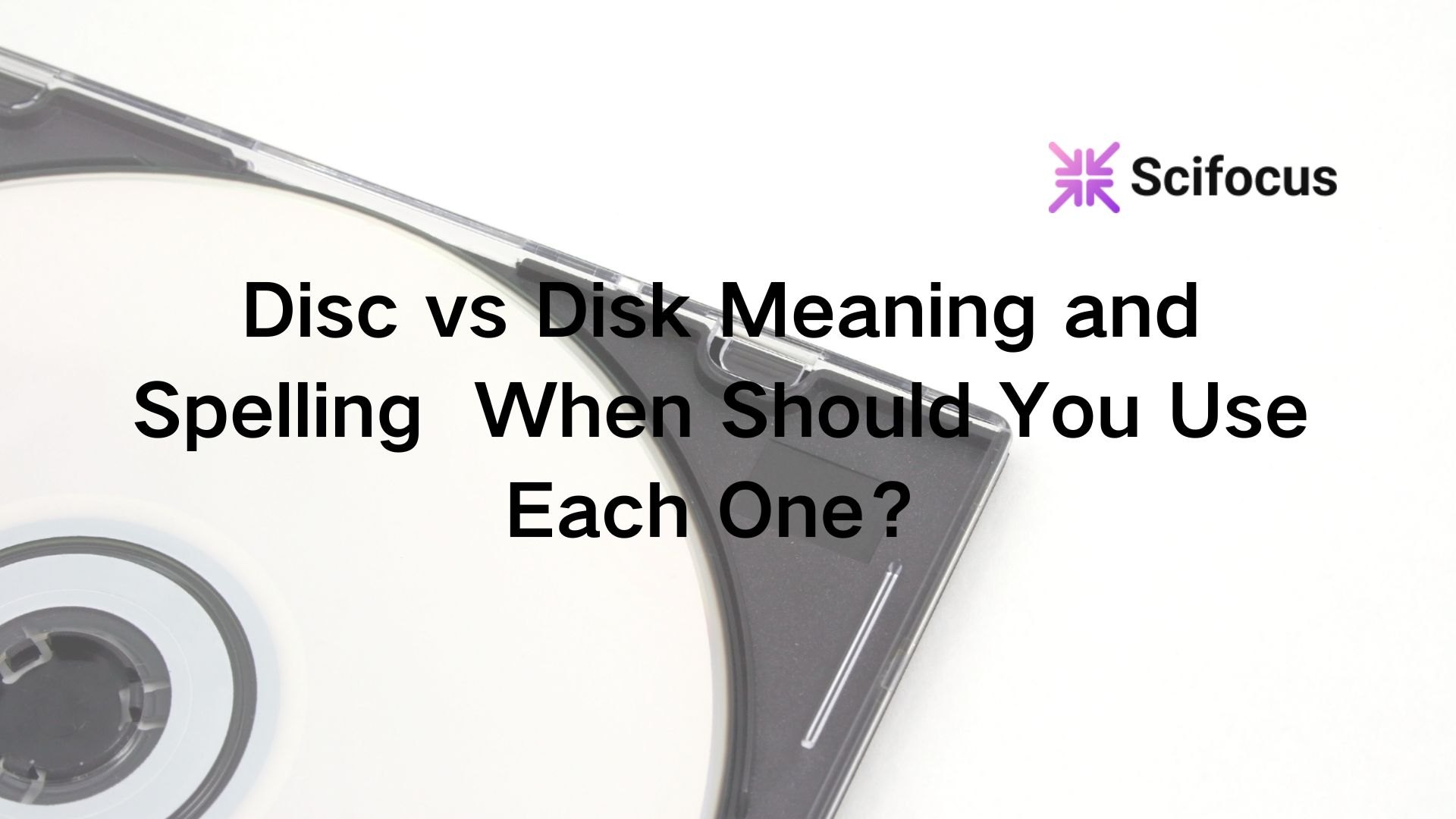Disc vs Disk Meaning and Spelling — When Should You Use Each One?
In general, disc leans British and anatomical, while disk leans American and technological. The difference isn’t random; it’s a story of language evolution, industry adoption, and how people decided to standardize spelling for different fields.

disc or disk — both are correct, but they’re used in different ways.
You’ll typically see “disc” in medical and optical contexts — think herniated disc, optic disc, or compact disc (CD).
Meanwhile, “disk” rules the world of computing and data storage — like hard disk drives (HDDs) or floppy disks.
if you want to master tricky English terms in science, medicine, or technology, Scifocus.ai is your go-to hub. It’s packed with tools and guides to help students write clearly, understand terminology, and avoid common mistakes. You can even explore academic writing support for students or get help with scientific English terms right from your browser.
Disc vs. Disk Meaning: Two Spellings, One Confusing Story
Here’s the thing — disc and disk both come from the same Greek root word diskos, meaning “something flat and round.” Over time, English borrowed it from Latin, then French, and somewhere along the way, both spellings stuck.
- Disc (British) — The spelling “disc” became more popular in British English.
- Disk (American) — “Disk” became the preferred spelling in American English, especially in scientific and computing contexts.
But here’s the plot twist: it’s not just about geography. The difference also depends on context — that is, what you’re talking about.
Disc vs. Disk Spelling: Is It a UK–US Thing or Something More?
You might think this is a simple “British vs. American spelling” issue, like colour and color. And sure, that plays a part.
But when it comes to disc vs disk spelling, there’s also a subtle distinction based on fields of use — medicine, technology, and music have each adopted one form more consistently.
| Context | Common Spelling | Example |
|---|---|---|
| Computers & Storage | Disk | Hard disk drive, floppy disk |
| Music & Media | Disc | Compact disc (CD), Blu-ray disc |
| Anatomy | Disc | Herniated disc, spinal disc |
| Optics & Astronomy | Disk | Solar disk, galactic disk |
It’s almost poetic — one word leans toward the digital and scientific, while the other stays close to the biological and cultural.
When to Use Disc vs. Disk: A Quick Rule of Thumb
Here’s a simple trick:
If it’s inside your body or plays your music, use “disc.”
If it’s in your computer, use “disk.”
Let’s make that real:
- Spinal disc, not spinal disk (though Americans sometimes mix this one up).
- Hard disk, not hard disc (unless you’re talking about optical storage like CDs).
- Compact disc (CD) , always spelled disc because that’s the official industry term.
You know what? Even manufacturers follow this rule. Apple calls it a “disc drive” when referring to CDs, but your PC calls it a “hard disk.” Both are technically correct in their own worlds.
The Computer Connection: Why Tech People Love “Disk”
Let’s geek out for a second. In the early days of computing — think 1950s and 1960s — engineers at IBM and other companies used “disk” to describe magnetic storage devices. These were literal magnetic disks, spinning inside drives, coated with iron oxide to store data.
When floppy disks came along, the same naming stuck. So “disk” became associated with anything magnetic and mechanical, while “disc” later evolved with optical storage — CDs, DVDs, and Blu-ray discs.
Medicine’s Favorite: Why Doctors Say “Spinal Disc”
In the medical world, disc reigns supreme. Whether you’re reading a radiology report or talking to a spine surgeon, it’s always “herniated disc,” not “herniated disk.”
Why? Medical Latin and British influence. Most anatomical terminology draws from Latin, and British English dominated early medical education globally. As a result, “disc” became standardized in medical texts.
You’ll see terms like:
- Intervertebral disc
- Cervical disc herniation
- Degenerative disc disease
It’s never “intervertebral disk disease.” That just sounds… off.
For reference, you can check out medical usage examples on PubMed’s ASC-US and cervical cytology research pages — where “disc” appears consistently in anatomy-related studies.
The Music Angle: How “Disc” Got Its Groove
Remember CDs? (Yes, those shiny round things from your parents’ car.)
When Sony and Philips launched the Compact Disc in 1982, they intentionally used the disc spelling — partly because it looked sleeker, but also to align with “discus,” the elegant Greek root.
It gave the product a sense of sophistication and continuity with older English. Vinyl records were round “discs,” so the new format inherited that same aesthetic.
So, while your computer had a hard disk, your music collection sat proudly on compact discs.
Brake Disc vs. Disk: Even Mechanics Can’t Agree
If you’re into cars, you’ve probably seen both spellings in manuals.
Most English-speaking countries prefer **“brake disc”**, especially in the UK and Commonwealth regions. In American automotive writing, “disk brake” sometimes appears — but “disc brake” has actually become the more globally accepted spelling.
It’s one of those rare crossovers where disc beat disk on both sides of the Atlantic. Maybe because “disc brake” just looks cleaner — and engineers are secretly aesthetic creatures.
Optic Disc vs. Disk: The Eye Has Its Own Opinion
Here’s where it gets extra interesting. In ophthalmology, it’s optic disc (the spot where the optic nerve meets the retina).
Why not “optic disk”? Because, again, medicine sticks to the “disc” spelling tradition.
So when your eye doctor talks about “optic disc cupping,” they’re not mixing spellings — they’re following convention.
Language Evolution: Both Spellings Are Here to Stay
Here’s the funny thing: dictionaries list both forms as correct.
Merriam-Webster, Oxford, and Cambridge all recognize disc and disk, with overlapping definitions. The choice really comes down to context, tradition, and sometimes just branding.
Apple’s “Disc Utility” tool could have easily been “Disk Utility” — and in fact, both existed at different times in macOS history. Language evolves like that — organically, unpredictably, and beautifully messy.
So don’t sweat it too much. The key is to stay consistent within your context. If you’re writing a medical paper, stick with disc. Writing about computers? Disk is your friend.
A Quick Recap: Disc vs. Disk Examples You’ll Actually Use
| Usage | Correct Spelling | Example Sentence |
|---|---|---|
| Anatomy | Disc | She was diagnosed with a herniateddisc. |
| Computer Storage | Disk | The system couldn’t find thedisk drive. |
| Music / Optical Media | Disc | He burned the playlist onto aCD disc. |
| Cars | Disc | The car usesdisc brakesfor better stopping power. |
| Astronomy | Disk | The Milky Way’sdiskspans 100,000 light-years. |
Disc vs. Disk: Which One Should You Use?
Honestly? Don’t overthink it.
Use disc for anything biological, musical, or optical, and disk for anything digital or magnetic.
If you’re not sure which fits your paper or presentation, tools like Scifocus.ai Academic Writer can help refine your language automatically — perfect for students balancing medical and technical subjects.
FAQs About Disc vs. Disk
Why are there two spellings of disc and disk?
Both come from the same Greek root diskos. “Disc” became more common in British English and medical usage, while “disk” became standard in American English and computing.
Is it “herniated disc” or “herniated disk”?
The correct spelling is herniated disc, as used in medical literature and anatomy.
Is it “hard disc” or “hard disk”?
Use hard disk — that’s the standard term for computer storage devices.
Why is it called a “compact disc” and not “compact disk”?
Because the creators (Philips and Sony) chose the “disc” spelling for aesthetic and linguistic continuity with vinyl records.
Can I use disc and disk interchangeably?
In casual writing, yes. But in professional or academic contexts, use the version that matches the field — “disc” for medicine, “disk” for computing
Did you like this article? Explore a few more related posts.
Start Your Research Journey With Scifocus Today
Create your free Scifocus account today and take your research to the next level. Experience the difference firsthand—your journey to academic excellence starts here.
